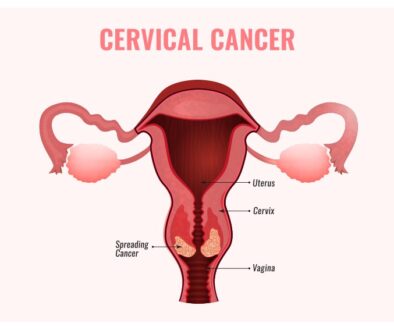Risk Factors for Uterine Cancer & Prevention
Risk factors for uterine cancer: Uterine sarcoma or endometrial cancer is the third leading type of cancer in women. The exact cause of uterine cancer is still unknown. However, there are certain risk factors that put a woman at risk of developing uterine cancer.
Cells in the uterus mutate due to mutations in the DNA. This may result in disrupting functions that control cell growth and cell division. In a majority of cases, cancer cells develop in the inner lining of the uterus (endometrium). This type of cancer is known as endometrial cancer.
Risk factors for uterine cancer
The following are some of the known risk factors for uterine cancer:
Age: endometrial cancer is often diagnosed in older women. Therefore, advancing age is a risk factor.
Menstrual irregularities and Infertility: Hormonal imbalances (estrogen and progesterone hormone levels) may lead to irregular menstrual cycles and infertility – thus increasing the risk of endometrial cancer.
No pregnancy and childbirth or nulliparity increase the risk of endometrial cancer.
Early puberty (menarche) and late menopause may also increase the risk.
Endometrial hyperplasia
Cells and glandular structures build up causing the thickening of the endometrium (the lining of the uterus). This condition is known as endometrial hyperplasia. There are different types of endometrial hyperplasia including simple, complex, and atypical hyperplasia. Hyperplasia mostly occurs in women after menopause due to imbalances in estrogen and progesterone hormones. A family history, obesity, and other medical conditions may increase the risk of developing hyperplasia. According to the American Cancer Society (ACS), women with atypical endometrial hyperplasia are at risk of developing endometrial cancer.
Metabolic syndrome
If a set of conditions such as high levels of triglycerides, high blood pressure, high blood sugar, and excess fat around the hip and abdomen develop at the same time. It is known as metabolic syndrome.
Obesity: There is a strong link between obesity (higher body mass index) and an increased risk of endometrial cancer. In older and obese women, the risk of endometrial cancer increases after menopause.
Previous pelvic radiation therapy: women who have undergone radiation therapy in the pelvic area in the past are at risk of developing endometrial cancer.
HRT after menopause: hormone replacement therapy after menopause involving estrogen replacement without increasing progesterone levels may increase the risk of developing uterine cancer.
Drugs – The drug tamoxifen used in the treatment of breast cancer may slightly increase the risk of endometrial cancer by spurring the growth of endometrial lining in some post-menopausal women.
Family history of cancer
Less than 5% of uterine cancers are linked to hereditary factors. If a woman has several members of her family who have had endometrial cancer – she is counseled for genetic testing.
Lynch syndrome
If genes involved in mismatch DNA repair don’t work properly due to mutations, then mistakes develop in the DNA and lead to gene mutations and eventually to cancer. In women with Lynch syndrome, the risk of colorectal and endometrial cancers increases manifolds.
Prevention of Endometrial Cancer
The cause of uterine sarcoma or endometrial cancer is not known. However, women can take the following steps to prevent or reduce the risk of developing uterine cancer:
Reduce weight – maintaining healthy body weight and regular exercise can help reduce the risk of developing uterine cancer.
Manage diabetes – It is a major risk factor for a number of issues such as high blood pressure, heart disease, kidney disease, and metabolic syndrome. Maintaining blood glucose levels can help reduce the risk of developing uterine cancer.
Women who are at risk owing to a family history of cancer and metabolic syndrome or any other health issue – such as lynch syndrome should undergo genetic screening after discussing their concerns with their gynecologic oncologist.
Consult a female oncologist and have regular checkups with the doctor – especially if you have any gynecological condition, pelvic pain, or abnormal bleeding.
If you have any other concerns regarding the risk factors for uterine cancer then meet me.




